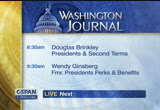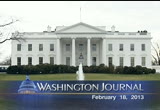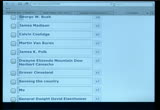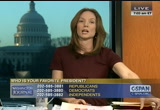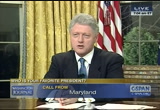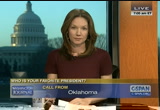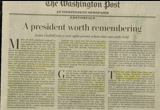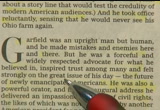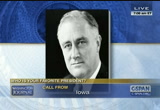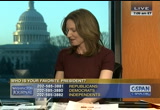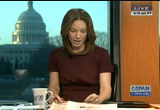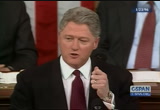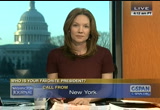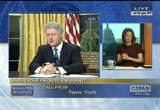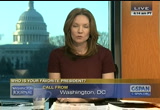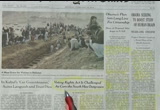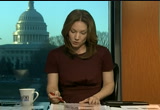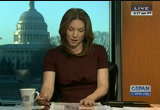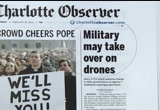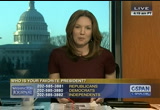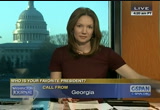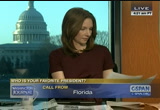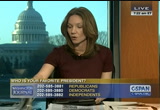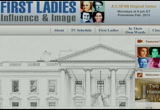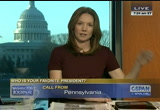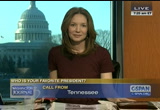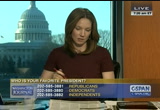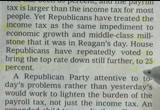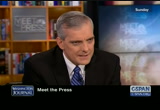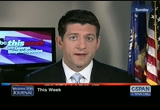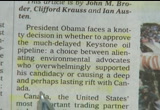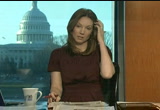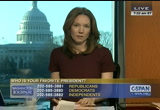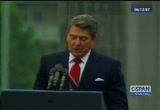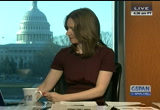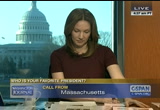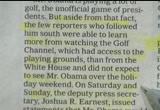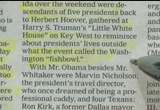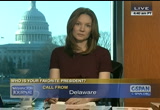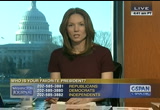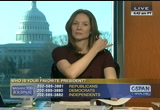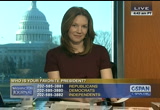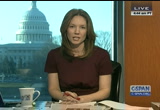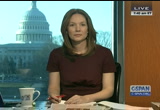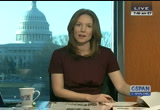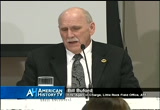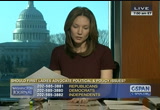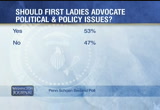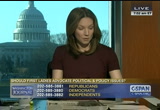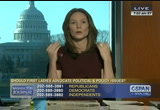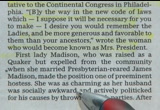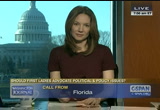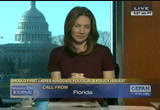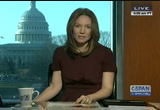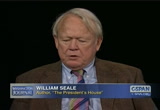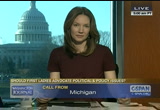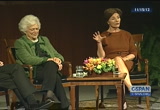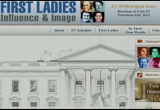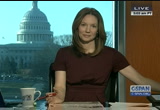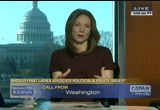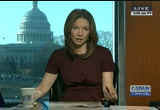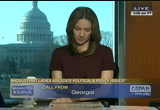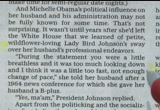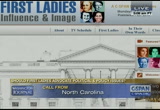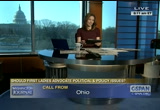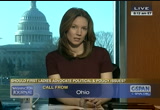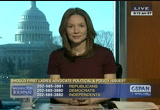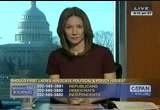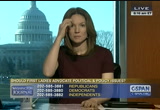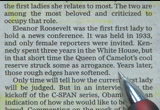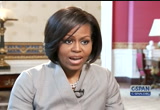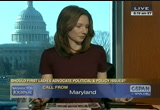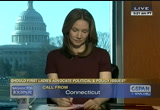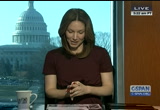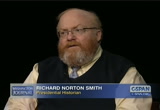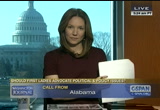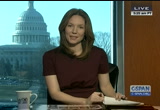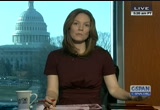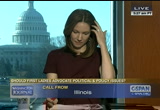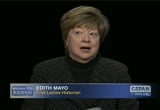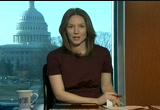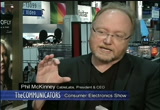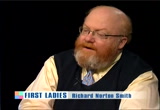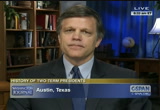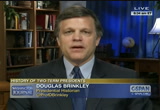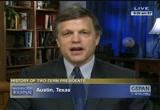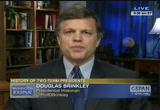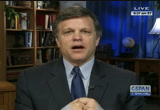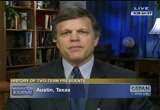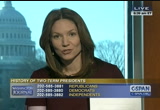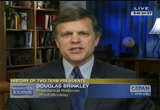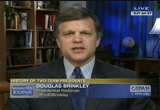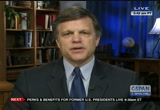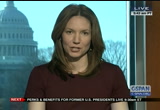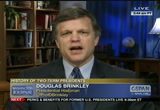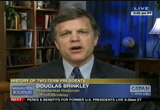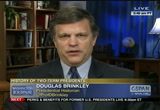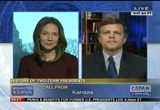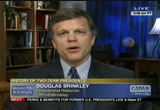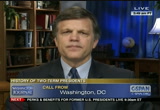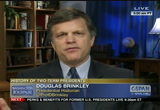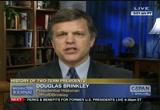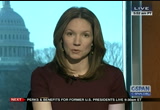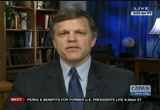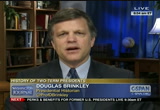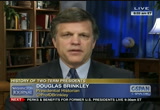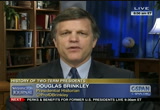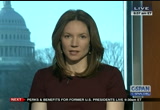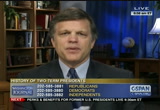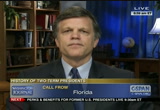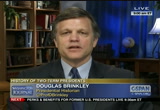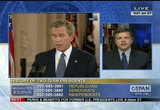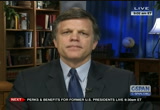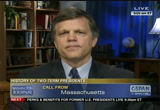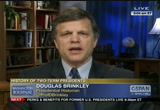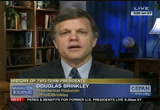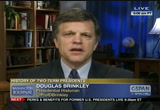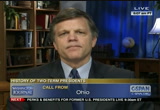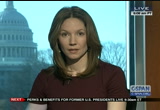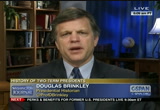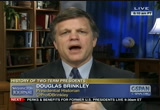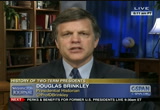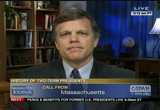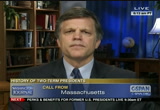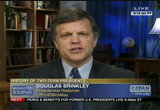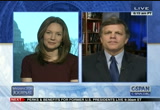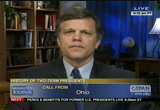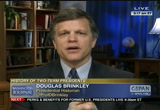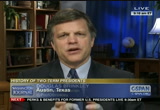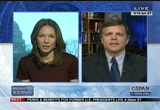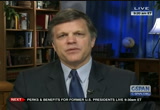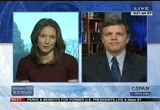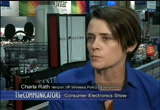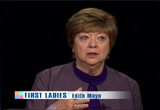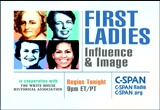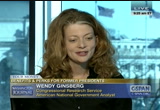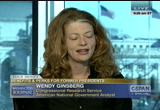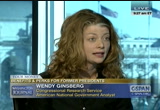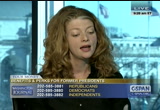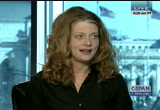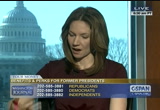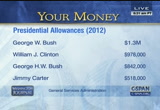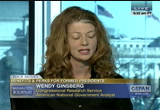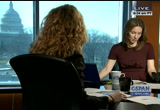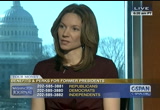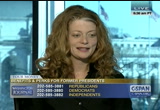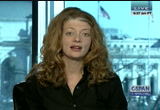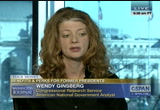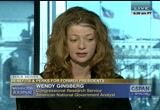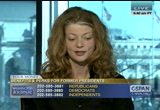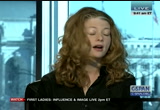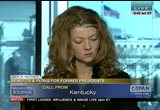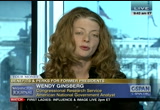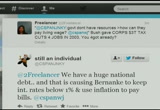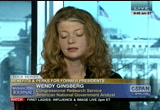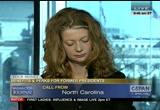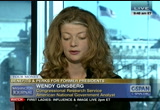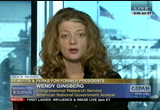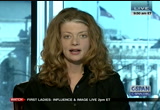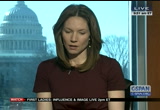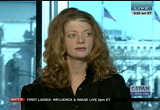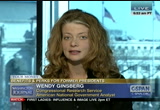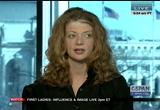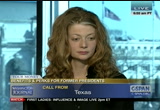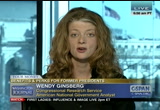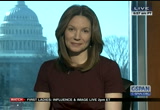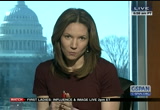tv Washington Journal CSPAN February 18, 2013 7:00am-10:00am EST
7:00 am
later, wendy ginsbert. -- ginsberg. host: good morning and welcome on this president's day, 2013. president obama's plan to tackle to its immigration laws has drawn anger from republicans with marco rubio calling the proposal dead on arrival. the debate is sure to pick up again when congress returns from its presidents' day holiday. president obama took the weekend to play golf at an exclusive resort in florida. we will take a break from the normal daily debates and spend a first 45 minutes getting your take on your favorite president.
7:01 am
7:02 am
7:03 am
we're getting your take this morning on this president's day. who is your favorite and why? the phone numbers -- all others, 202-585-3882. we will get to your phone calls. but voice of america put out a piece, talking about the u.s. celebrating president's day. it first became a federal holiday in 1879 to celebrate the
7:04 am
february 22nd birthday of george washington, the first u.s. president. joe in maryland, democrat, hi. caller: my favorit would have to have been bill clinton. there are so many to choose from. i was very young. it was in high school at the time. he put into place a lot of laws that allow for people like me to go to college. beyond that, he was just incredibly involved in science necessarily see a lot of a a lot of presidents do now.
7:05 am
host: from oklahoma, an independent caller. caller: my favorite president has to be lyndon johnson. look what he did for civil rights not only for americans but for everybody in this country. he fought through the garage of our southern states, and he got it through. -- fought through the brage of our southern states. lyndon johnson said, "when i sign these proclamations, i am turning the south over to the republican party." the city just agreed with the emancipation proclamation. this is in 2013.
7:06 am
lyndon johnson fought for all americans. i was debating whether it should be johnson or jimmy carter. jimmy carter, in the final history of this country is written, jimmy carter will be among the best up there, not ronald reagan. look what jimmy carter did, by holding to signing treaties with panama, he gave the panama canal back to the panamanians. george bush's father arrested noriega and put him in jail. thank you. host: the washington post editorial page weighs in on the question --
7:08 am
who gets the washington post this morning on past presidents. iowa, democratic caller, lisa. caller: good morning. president roosevelt. he was the first president i can rememberhcane helped elderly people who did not have anything. i think he started social security. he had a disability, but it did not stop him from being the best president we ever had and never will. host: what would your parents
7:09 am
etc. this question? >> they would've said the same thing if they were alive, i believe. >> is this a president you talked about with your parents? the firsts, he's president i remember. i think i was in grade school when he passed away. host: remember your parents talking about him around the dinner table? caller: yes, in the dinner table abandon the cotton fields dinnerhouma, louisiana -- around the dinner table and in the cotton fields of houma, louisiana. host: are you retired? caller: i am retired, i am in my 70's. host: minneapolis. caller: my favorite is fdr, mainly because my father worked
7:10 am
for the ccc camp. at that time they got $30 a month and and they sent $25 home to the farms and kept most of the farm's going. they kept $5 for themselves. the worst is bill clinton because he signed a free-trade agreement with china. host: nafta? caller: not that. the free-trade agreement with china that gave china most- favored-nation trading status that allowed all of our jobs to go to china. host: richard says that bill clinton was his least favorite. our first caller said that bill clinton was his favorite. on january 23, 1996, here is president clinton during his last state of the union address from his first term. [video clip] >> we know government does not
7:11 am
have all the answers. we know there's not a program for every problem. [applause] we know and we have worked to give the american people a smaller, less bureaucratic government in washington. we have to give the american people one that lives within its means. [cheers and applause] the era of big government is over. [cheers and applause] but we cannot go back to the time when our citizens or left to fend for themselves. [cheers and applause]
7:12 am
instead we must go forward as one america, one nation working together to meet the challenges we face together. self-reliance and teamwork are not opposing virtues. we must have both. host: president bill clinton and after the government shutdown. that took place during his administration. we're talking about your favorite president. george is an independent in new york. caller: good morning. bill clinton, because he took a country that was -- he received the country from george h. w. bush, who did not seem to be a strong president to me, did not really care. we were floundering and he
7:13 am
balanced budget, gave us a surplus, and basically showed us it can be done and it can be done very easily. the worst president is jr. bush, because he took a surplus, gave tax cuts to his friends, and squandered a lot of money and sent our kids to war. host: what do you do and how old are you? caller: retired, 62, disability, not happy about it. host: when clinton was in office, were you working? caller: i was. i was happy. i'm still proud to be an american, but i'd just like the way things are going. they offended over the country to the corporations and oil companies. host: have you always voted for democrats? caller: i have always voted for who i thought was best.
7:14 am
i call myself a patriot, not an independent or democrat or republican. i voted for richard nixon, ronald reagan, but after the george bush fiasco, the republicans will not give back the tax cuts that george bush's friends liked and they still like thim. they want to get rid of things people need like social security and medicare. host: paul is a republican. caller: good morning. favorite is george bush. host: george w. or george h. w.? caller: george w. bush. host: why?
7:15 am
out, iot going to find guess. let's go to democratic caller in iowa. caller: good morning. my favorite is john f. kennedy. he was brilliant. when he gave his inaugural address, he started the peace corps and he brought young kids to help out with the country. he and his brothers were for the poor. it was not just for the rich. he's my favorite. thank you. host: we will keep getting your thoughts on your favorite president throughout the first part of the morning. let me give you some other headlines in the papers. the new york times front page --
7:16 am
7:17 am
two dates -- this was part of the sunday talk shows, the debate over whether or not the president should be putting out the immigration plan when a bipartisan group on capitol hill is working on legislation. denis mcdonough was on meet the press to address the issue. paul ryan was all this week responding to the white house. we will show you that, what the two sides have to say. marco rubio from florida said that this plan is dead on arrival, that republicans are upset with the president putting this fourth. a third story in the new york times, the obama administration is planning --
7:18 am
that on the front page of the times. the philadelphia inquirer has disavowed a frequent guest here on the washington journal, pour mr. lin for governor. -- poised to run for governor. and the military may take over drones for the cia. that's the charlotte observer with that on the front page. also, the los angeles times has this --
7:19 am
7:20 am
because he's such a devilish character, but he also did stuff like opening up china. host: all right. we're featuring nixon on american history tv. you can watch on c-span3. we will look at his legacy and the 1993 atf raid in waco, texas. long beach, independent caller, neal. you are on the air? moving on. charles, atlanta, georgia, democrat, hi. caller: hi. our greatest president was john f. kennedy, by far. the reason is because he gave us the good society speech in which he warned americans about the secret societies that were
7:21 am
determined to take over america and the change america fundamentally. he was the only president that had the guts to look out for americans. we failed him because we did not find our who was behind the assassination of our president. host: all right. butch in st. petersburg, florida, a democrat, hi. caller: my favorite president is barack obama, because of the things that he has accomplished. so many people came to washington for his inauguration. when the first was elected, he also was the nobel prize winner. he's the best president so far. host: all right.
7:22 am
that is our question for all of you. here's "the huffington post website this morning with 12 presidential quotes -- we're getting your take on your favorite president this morning and why. you can post your comments on our facebook page and take a poll. coming up on the journal in about 20 minutes or so, we will get your take on the first
7:23 am
ladies. c-span is kicking off a two-part series looking at the nation's first ladies. here's an ad about the series in "usa today." it kicks off a 2:00 p.m. today eastern time live with a panel discussion about the influence of the first ladies. we are partnering with the white house historical foundation for this two season original series. go to our website. there is on your screen. c-span.org/firstladies. it is interactive. you can link to the white house historical association redding of pictures and a book you can purchase on their web site. tonight at 9:00 p.m. eastern time,. before that, 2:00 p.m. this afternoon for the panel discussion on c-span.
7:24 am
90 minutes, each of these segments will be. they will air on mondays at 9:00 p.m.. next monday, february 25, we kick off with martha washington. we will turn our attention to the first ladies in 20 minutes on whether they should be involved in political and policy debates. let's go to billy in philadelphia, independent. lincoln is your favorite? caller: yes, that's right. because he gave the ultimate sacrifice and he tried to better people's lives with freedom and everything. host: who comes in second? caller: that would be clinton with the economy. he picked up the economy and we had a surplus. host: who wood your parents have said? caller: probably fdr, because he
7:25 am
helped everybody, like social security and when there was no work, he helped people find work, came up with programs to help them get work. i'm not sure what it was called because i was not keeping up with it back then. all these programs became up with to help the working man. host: you remember your parents talking about this? caller: i do. host: how did they view government back then? caller: before he helped them, they probably gave it a 0 rating. host: francis, tennessee, republican caller. george washington? caller: correct. because he started the country, made the constitution were initially. before that, and he was the first in war, the first increase. he was a good and virtuous man
7:26 am
and set an example for the rest of the president's to follow. host: what example is that? caller: he served two terms and stepped down. he advocated for a long time, people staying out of foreign entanglements. host: who would your parents have said? caller: i don't know, but i hope it would've said ronald reagan. because he took over our country that was in trouble, and% unemployment, trouble with the soviet -- or the communist bloc. host: were your parents republicans? caller: not at first, but later. host: a conservatives in washington ramesh ponnuru writes --
7:28 am
so that is ramesh ponnuru on walt gray in this morning in the new york times op-ed pages. we're getting your take on your favorite presidents. we will continue to do that. first, "usa today" has the headline that many of the papers have. dennis mcdonald was on meet the press, president obama's new chief of staff, talking about the bill. [video clip] >> this report, all it says to
7:29 am
me is we are doing exactly what we said we would do, which is what we prepared in the event the bipartisan talks on the hill -- which we are aggressively supporting, if those don't work out, then we will have an option that will be ready. >> with the president's support something that is more conservative, more stringent than his principles, would be supported with the overall goal of getting a comprehensive bill? >> i will not say what we will or will not support in the abstract. we want to continue building on the great strategy of border security, want to crack down on businesses that are gaming the system, we want and earned path to citizenship, and we want to the legal system, which is broken, we want that to be reformed. we will continue to push that. host: paul ryan, the top republican on the house budget committee, was also on the sunday talk shows this week. he responded to the white house
7:30 am
leaked report on immigration. [video clip] >> actually i don't. i didn't think that his words were measured in the state of the union. leaking this out does set things the wrong direction. the questions always have to ask ourselves, particularly with this point house, is the president looking for a partisan advantage for a bipartisan law? by putting these details out without addressing future flow, by giving advantage to those zero cuts in front of line, not dealing with border security adequately, that tells us he is looking for partisan advantage and not a bipartisan solution. there are groups in the house and senate working together to get this done. when he does things like that, it makes it much more difficult to do that. this is counterproductive. host: the latest on immigration reform. in other headlines, years the washington post this morning --
7:31 am
7:32 am
7:33 am
automatic spending cuts to the tune of $85 billion. a republican caller now from pennsylvania, john. reagan is your favorite? caller: ronald reagan created a lot of jobs. he got rid of most of the soviet union's power. he answered all of my mail every time i send him a letter, he would return it, he would sign it. mr. obama, i did send him a lot of letters about the economy and he never answers. we are in big trouble if we don't renew the capital gains taxes, the corporate tax, the real-estate taxes, and school taxes. if obama does not do any of that, the country will go broke. it's already broke. when mr. reagan was there, he was a lovely president. him.ve
7:34 am
host: what did you think of ronald reagan's foreign policy? caller: he had a good foreign policy. the increased our navy, our air force. that's how he defeated the soviet union. nobody ever did that. host: june 12, 1987, ronald reagan, in a speech to the people of west berlin about communism. [video clip] >> we welcome change and openness, but we believe freedom and security go together, that the in advance of human liberty can only strengthen the cause of world peace. there's one sign the soviets can make that would be unmistakable, that would advance drastically the cause of freedom and peace.
7:35 am
general secretary gorbachev, if you seek peace, if you seek prosperity for the soviet union, come to this gate. mr. gorbachev, open this gate. [cheers and applause] mr. gorbachev, tear down this wall. host: president ronald reagan. we have done a lot on the american presidents, house, and even those who did not make it to the presidency with our series "the contenders" last
7:36 am
year. go to the archives are our website, the video library at c- span.org. if you're interested in the ronald reagan speech or the bill clinton's state of the union, it's all in our archives. if we're getting your favorite president this morning and why. john and mountaintop, pennsylvania, republican. i'm sorry, i just talked to you. i did not realize you are on the line still. what do you think about that famous line from ronald reagan's speech? caller: that made me feel so proud that i cried. everytime i see ronald reagan i cry, because he was like a father to us. he was there for everyone of us. he answered all my mail every
7:37 am
time i write him. host: how old or you when he was the president? caller: i think i was about 42 years old. host: we will go to lisa in massachusetts, a democrat. you say president obama. caller: i like clinton and obama. clinton, because for people like me with a disability. i am 47 years old. i hope they continue with social security and disability. obama and clinton, a child care. for obama, i like him because when he is doing for people like me with a disability and giving people like me a chance to coe me through on other issues in
7:38 am
the economy. he is a very honest person that cares about all people. we all have to love one another and understand where they are coming from and be there for those persons and give them the right direction, because these days we need that direction. specially people like me with a disability. host: president obama is taking a long weekend for golfing in florida. this in the new york times this morning --
7:39 am
7:40 am
washington. caller: yes, ma'am. when we look at the historical precedents to george washington said as president and as commander-in-chief. without his presidency and is stepping down after his second term, he would not have it. he impressed king george so much that he volunteered to give up power that even king george commented. about commented -- king george commented about it. john adams would be a nice second place choice. after abraham lincoln, we had big government presidents with an overreaching executive power. a return to our founding president would serve this country and all of its citizens much better in the future.
7:41 am
host: daryl, what would your parents had said to this question of their favorite president? caller: my parents probably would have agreed with me. i know my father ed murray abraham lincoln quite a bit. my mother was more of a george washington or john adams. i guess i follow my mother's opinion on this side. -- my father admired abraham lincoln. host: was this important around the dinner table? caller: very important. we have forgotten where we have been today. so we have lost where we are going. if you don't know who you are as a people or as a nation, you will not be able to identify what you want to be in the future. host: sounds like you ever about american history and about the president's. caller: john adams, when he said .bout our constitution
7:42 am
we will never be who we were intended to be in the first place if we forget where we were. host: your favorite book on president's? caller: i cannot even remember the title of many of them. but history is one of my favorite subjects. i do like george herbert walker bush for the fact that he was my commander-in-chief when i deployed overseas in desert storm. as far as a favorite book, i don't think i can give you a title. i've read so many history books. "american patriots guide to history" is one of my favorites. i'm reading that currently. it opens your eyes as to who we really are when we sat ourselves down in our declaration of independence, which is where george washington was. after the declaration of independence was signed and bed on july 8, george washington
7:43 am
went to war while the continental congress when about telling the american people that we declare ourselves independent. not only was our first president -- before he was our president, he was already our commander-in-chief. without george washington, we would not have had any president's behind him. host: george h. w. bush stands out for you as a commander-in- chief? caller: i served under ronald reagan and george bush and bill clinton. i am retired navy. any retired military man will look at the presidency served under as commander-in-chief and recognize them as somebody who followed their orders when called, he answered. if you are going to compare george herbert walker bush to george washington, there's no comparison. host: modern-day commander-in- chief for you? caller: ronald reagan without a doubt.
7:44 am
the defining moment -- mr. gorbachev, tear down this wall. he ended the clampetts of global nuclear war. in one move, he moved to the nuclear armageddon clock five minutes and ended the cold war period. when you look at roosevelt and truman and potsdam following " world war ii, a lot of that did not need to happen, can be stepped up to the plate in that moment of history there may not have been a cold war. host: i want to get your take fire series that we are debuting today on c-span about first ladies and their influence and image. what you think about this idea of digging into the first ladies and their lives before they were part of the presidency and their lives after traveling all over the country to talk about it to these first ladies? caller: first ladies, i have to be honest, i have started the president's more. a man cannot be a man without a
7:45 am
wife and the mother in his family. you have to go back to martha washington, sewing our first continental flag. you have the wives of our presidents involved in their lives to the point where to say the presidential decisions are not done without consulting their wives is naive. you can look at some of the policies that were made and you can probably attribute a lot of back to their wives influence. host: should first lady's advocate political and policy issues? caller: that's probably best done in private. the president is the elected person there to answer the questions. i think the policy decisions should be made with the
7:46 am
president and his wife. and if we elect a female president, her husband and her spouse can have that discussion if in the white house over dinner. host: let me put this fourth for you as a history buff, daryl. the producers of this series on c-span have said a you will learn some new things not only about these first ladies but about their husbands as well and give you greater context of their husbands and the decisions that they made in the white house. caller: i am all for history. the more mr. you can put on c- span, as long as it's accurate history -- it must been with facts and not with spin, history you can put on c-span. host: we will have a live panel
7:47 am
discussion this afternoon. that will air again at 9:00 p.m. eastern time. february 25 we will kick things off with marvin washington, our first first lady. her early years before she came to the white house, her influence, her image, and for years after the white house. -- martha washington. pipa two season original series. our website is on your screen. an interactive web site. you can go and learn about the first lady's you might not know a lot about. when we come back after the break, we will turn our attention to the first lady's fies for 45 minutes and get your take on whether you think they should be advocating political and other influence. we will be right back. [video clip] >> i think the women themselves
7:48 am
in many cases were interested in werebut had no vehicle to express that in their own lives, so they were attracted to men who were going to become politically active or were already politically active. >> each of them i find intriguing, probably half of them in particular precisely because they're so obscure historical. half of these women probably would be almost totally unrecognizable to most men and women on the street. >> tonight, c-span's new series "first ladies: influence and the image." chefs, curators, social organizers. these and one begins tonight at 9:00 eastern and pacific on c-
7:49 am
span, c-span radio, and c- span.org. 2:00 p.m. eastern on c-span, earlier in the day, you can watch the program. [video clip] >> i had dealt with a number of other religious cults that have similar philosophies to david koresh's. i had found that in some of these cases, when they are leading such groups that they make certain prophesies as to things that are going to happen. when these things don't happen, they begin to lose face. when they begin to lose face, then they have to do something to make it happen so that they don't lose face. he had a bird's nest on the ground. he had everything going for him. he was not about to give that up. one of the situations that i was concerned about that i have seen happen with similar groups in the past was that he would need
7:50 am
to do something in order to bring about his prophecy of this armageddon where law enforcement would assault the compound, they could hold out, they would all die. and in three days they would be resurrected and he would be the good jesus at that point and may be living in the garden of eden. >> former atf agents recount the raid in texas, tonight on american history tv on c-span3. "washington journal" continues. host: welcome back on this president's day, february 18. we will talk about our new series debuting today at 2:00 p.m. eastern time, a panel discussion about the influence and goal and image of first ladies. in the style section of the washington post it has a piece about our yearlong series of
7:51 am
american presidents' wives beginning tonight. we will air that panel discussion again at 9:00 p.m. eastern tonight. two panel discussions on the topic of first ladies. if monday, february 25 at 9:00 p.m. eastern, martha washington. then we will go through the first place. we will do the series in two parts. we will take the summer off and we return in the fall to continue looking at the first lady's all the way up to michelle obama. in conjunction with the new series, we did a poll, a national survey conducted on line for us about first ladies. how does your opinion -- excuse me, this is the first question --
7:52 am
so we want to hear from men and women on this issue of what you think the role of the first lady should be. 202-585-3882, for all others. we're taking your comments on facebook, on twitter, or you can send us an e-mail on this topic. should they be advocating political and policy issues? more from the poll that we did. does opinion of first ladies that influence your view of the president?
7:53 am
7:55 am
go to our website c-span.org. you can see bios of historians participating in the series. we have pictures of althol the first ladies and you can click on them. her biography will be there when you click on it. there's also linked to the white house historical association also on our website. we have partnered with them for this series.
7:56 am
in tennessee, a democratic caller. what are your thoughts, first ladies advocating political and policy issues? caller: yes, i think first lady is a title that has become a roll over time. -- a role. it is no different than a man's wife or a preacher's wife. i don't think the first lady's role should be to advocate politically but only to support her husband or the president's views. host: sarasota, florida, republican caller, jo. caller: good morning. let me preface by saying a member of my family came over on the mayflower. they went back. there were a member of the crew. i'm coming at this from a long viewership of c-span. any time a first lady starts to
7:57 am
get into politics, which she should be able to do, then then she should be open up to the same type of criticism that we are all so eloquently doing today. everything she says should be scrutinized just like it seems to be about every president we have these days. no flack. you open your mouth, you are into the fray. host: do you think that happened with hillary clinton and nancy reagan? caller: when hillary clinton went on late-night television and she said "everything that has been said about my husband is a right-wing conspiracy," and nancy reagan when she changed out the china in the white
7:58 am
house, she was criticized beyond belief. but that goes on and on. what about eleanor roosevelt? we can go back and forth and back and forth. i think it's because we don't want to really deal with the serious issues and that this country is facing, right in your face today. if michelle obama wants to say something radical, which she has said before many times, she has stepped into the fray. whoever does that steps into the whirlpool and they will get whatever the media wants to say about them. god bless them all and i wish them all very well. thank you. host: 1 of historians participating in this series, here's what he had to say on the first lady's role as confidante.
7:59 am
[video clip] >> she becomes the chief confidante. she's the only one in the world he can trust, in a way, so he unloads to her and talked to her. they have all done that. they are all strong women. they usually accompany a strong man to where he is. i would say that is their main role, confidante to the president. but then they do have these other consistent goals of appearing to be the hostess of the white house. -- consistent roles. other times their hands on first ladies that approve all menus and everything, such as mrs. eisenhower and mrs. kennedy. that sort of detail. but there are other people who really carry that low. but it's the two of them together that's the head of the whole business. it's a pretty lonely house without a first lady. host: to help kick off our
8:00 am
series about first ladies, their image and their role and includes the white house. we're getting your take iris in michigan. caller: hi. my husband had a title but i was his wife. whenever i did i did. it worked out successfully. i don't think that much attention should be paid to the first lady's fashion. no more focus is on her. it is nice if she has something to do. it should not interfere or intrude on the president's job. it is a job.
8:01 am
i like what jackie kennedy did. she refurbished the white house. i think her role is of a wife. i do not feel her politics matter to the country. if she wants to do something good, that's great. adon't think they should get more focused than the wives of other people who have good jobs, better jobs, or in between. and take care of the family. host: this is or bush on her take of the first lady. [video clip] >> the first lady has a podium and she chose to use it. i think knowing that -- after i
8:02 am
made the presidential radio address at the treatment of women and children in afghanistan by the taliban. we went shopping. ladies that the cosmetics counter in the department store came up and said thank you so much for speaking for women in afghanistan. that was the first time i thought, hey, they heard me. i knew what ladybird had set of course. host: laura bush in tehran words on the use of first lady -- in her own words. we have all the first ladies in their own words. you can go to the website and
8:03 am
see what many people have said about the role of the first lady. that is all on our website, c- span.org \firstladies. this is one from martha washington. host: "steady as a clock, busy as a bee." host: jordan, democratic caller. caller: i love all the first lady's and have loved all the first ladies in all my years. are anothert lady's voice piece for any and every
8:04 am
issue that we should be talking about in our country and around the world. they promote any type of legislation or any of the issues that we need to be talking about. they get to use that in one of the most public personas through the media. there is no way any of the presidents of the united states would have been able to do anything they did a lester was a night martha washington or in mrs. thomas jefferson standing beside them and the white house. host: who do you think has been successful, modern-day first place at advocating something they cared about? nancy reagan say no to drugs.
8:05 am
caller: in my experience, i have to go back to mrs. clinton and everything she did in the senate or in congress. whenever she would get into an argument about any issue, she would stand her ground. as much as i grew up watching -- i can give you a specific issue right now. just the tenacity of that woman. she was so positive. women have that ability. it is lovely. host: advocating for health care as a first lady that president clinton wanted to put forward, testifying on capitol hill. linda in georgia.
8:06 am
you are on the air. caller: hello. good morning. host: good morning. caller: i was thinking the first lady should be involved in policies -- no, she shouldn't. charities and stuff, yes, but not the president's job. that is his job. as far as lawyers like her having the job, he needs her to travel with him or whenever. she should be there with her husband. that is replaced with him. host: ok, linda.
8:08 am
host: said richard norton smith in "the washington post" this morning. good morning, david. what are your thoughts on this topic? good idea? caller: yes. host: why? caller: i think american women should not be role models for all womens' of the world, with their husband or not with their husband. american women is not the role model of the world. host: that is david. this comes from twitter.
8:09 am
host: here is what the former first lady hillary clinton had to say about the role of first ladies and an event honoring them. [video clip] >> i was asked to say a few words about this event and remarkable gathering of the women whom you saw on the stage. i feel privileged to be in their company. women who have contributed to our country in so many ways. as i have learned this past 15 months, there is no prescription or role model or cookbook for being first lady. if you look back at the lives of martha washington or abigail adams or dolly madison or edith
8:10 am
wilson or many eisenhower, you can see -- mamie eisenhower, each woman has defined the role as true for herself. how she can make her contribution to our nation. whenever our individual causes, all first ladies share one common goal -- to help in rich -- enrich the appreciation of this beautiful country and each has in some light tried to enhance and preserve the natural beauty around us. walking along the white house grounds, i am reminded about all of the people who have lived there before and all of the women. you can see in the trees that
8:11 am
were planted, but their handiwork and their concern. host: hillary clinton in 1994 at an event honoring first ladies. kevin in ohio, what do you think? caller: i like betty ford and what she did with the equal rights amendment for women of modern-day. think the ford's overall -- president ford pardoned richard nixon and the healing for the country. i like the fords and what they did in their short time in office. host: hi, mary. caller: good morning. i admire the women who are first ladies and do it worthwhile projects.
8:12 am
assigning that role to them, it takes away from the possibility that there could be a woman president. obviously the gentleman gets smart and gets elected president and his little self is supposed to do something nice. i think it is putting women into a role that does not allow them to go on to the next step. caller: may i ask how old you are? caller: i am 43. host: what is hillary clinton were to run for president? caller: i think the way she conducted herself as first lady was not very good. she did a magnificent job as the
8:13 am
secretary of state. so i think she erased all that stuff she did as first lady. host: do you think she was able to become senator of new york because of the way she was as first lady? caller: well, all i can think of is her as first lady as what the gentleman said before when he said this is a right-wing plot against my husband. that is all that comes to mind for her as first lady. host: democratic caller from washington, d.c. caller: i think the first lady is walking through the same date as her husband in the political realm.
8:14 am
she is truly supporting him. we've looked to her in many ways. she is taking a step with the president. all great leaders have had a great woman behind them. -- n and burst and kings even emperors and kings. women provide that balance. eisenhower and mrs. obama and mrs. clinton was one of the greatest in my opinion. she made her ground and stated and was pharaoh in everything she did. -- she was pharaoh in everything she did. mrs. obama is no difference.
8:15 am
there's always a change in the climate and the running of the country. host: what do you think about the attention first ladies get for their image? caller: it is crucial to make yourself appear a properly. being the first lady is the loyalty of the united states, much like the queen of england if she were to have a king. you are representing our country. each of first lady understands that, as any woman would. so yes, it would come with the territory. she will look her best,
8:16 am
especially someone in power. it should not be paid someone's attention. each of these women are totally influential of what is going on in the country. .hat's what these women use look at kennedy. she used her style to be in arrowhead in history. there was so much attached to that. these women use what they can. they are intelligent. presenting yourself well as one way to make herself heard. host: "influence an image" is what we will be talking about for all the first lady's. we debut our series today on c-
8:17 am
span with a discussion about the topic of first ladies. if you miss it, we will re- air it tonight at 9:00 p.m.. every monday on c-span at 9:00 p.m. eastern time, looking at each of first lady. we began with martha washington and we go through michelle obama. more from "the washington post 's" style section this morning.
8:18 am
8:19 am
tradition that is american's. host: first lady michelle obama. there's more on our website, c- span.org. jj in silver spring, maryland. caller: good morning. it can at times shoulder ignorance of other aspects of the policies. nancy reagan was in the former soviet union and was touring churches with lisa gorbachev -- raisa gorbachev. she made an effort to bring a focus on the lack of religious freedom in the former soviet union.
8:20 am
it was united states policy at one time. it resulted in the deaths of hundreds of americans at wounded knee. the policy was to stamp out the ghost movement. that is a piece of american history a lot of people do not know about. he should have some knowledge about that. host: bill from connecticut. caller: good morning. i think the role of the spouse of the president should be whenever the president and the spouse what the role to be. ernesto constitutional
8:21 am
definition of the spouse of the president's -- there is no constitutional definition of the spouse of the president. the spouse of the president can be an effective person in setting lots of agendas that are part of the government and part of the white house. there is no direct power that goes to the spouse of the president. the spouse has a tremendous indirect power. napoleon wrote true power is in direct power and i think he was right on that. it is up to them about what the role of the spouse of the president should be. host: carlos from oklahoma.
8:22 am
caller: good morning. how long after the first lady has been in office with her husband -- this is a different question -- which should be considered for president? michelle obama it is one of the most educated ladies in recent times. how long after that which should be considered for the role? host: would you like to see her run someday? caller: i think her moral character is very good and she could do well. host: here's richard norton smith, frequent guest on "washington journal," talking about ladybird johnson. [video clip] >> lady bird johnson is a
8:23 am
traditional first lady who made it very clear to anyone who would listen that her husband's welfare came first and she came third. but equally important, she is an advocate. will know about beautification -- we all know about beautification. ladybird johnson is an environmentalist long before that term caught on. it wasn't just america getting less ugly. she was into goal in the creation of the headstart program. if she had done nothing else, that would entitle her to a significant place in history.
8:24 am
host: richard norton smith on lady bird johnson and her role as first lady. the influence and image of the first lady's beginning with martha washington. we will go through all the first ies. we are kicking off the series today about first ladies. democratic caller, hi there. go ahead. caller: my thought about women in politics -- is that right? host: that is right. caller: i think they should be able to participate. i think that he should continue to use women. some have been criticized for
8:25 am
sitting in the back of everything. men have always been on the top of everything. women are speaking out more and i think they should be able to speak political and have their own issues about the things that are going on in america. god has always used man so far and not women. host: that is part of the series we will be talking about. their stewardship of the white house and their approach to private and public life. those are the topics we will delve into in this new c-span series. republican caller from new york. air.ou're on the listen to me and not on the television.
8:26 am
caller: thank you for taking my call. i would like to express my views about the role of the first ladies. they have not been elected to office leiter husband's -- like their husbands. she should have charities -- most of the country but never policy. look what happened in benghazi. thank you very much. host: masscult you are -- may i ask how old you are? caller: yes. you? how old aere
8:27 am
caller: i didn't understand the question. i am 77. i remember eleanor roosevelt. 77. host: we will go on to thomas in illinois. caller: good morning. i do not think we should generalize this. it depends on the first lady, the issue, the president. bill clinton was the first lady. i would like to see him go through ego management. the first lady, should be open to criticism if he makes comments about policy and even ridicule.
8:28 am
host: a contributor had this to say about the first lady the we have not talked about. [video clip] >> nelly taft interests me more than the others on the list. she was very bright, very astute politically. had she been male, would have gone into politics herself. that was not possible and that era. picked a man that would take her into politics and made her his first priority. she acted out her fantasy of wanting to be in the white house. i think that makes for interesting as far as a first lady. host: part of our first lady
8:29 am
series. c-span conducted a poll online in conjunction for this series. host: 56% of male say no to pushing for policy positions. nancy in pennsylvania. caller: hi, how are you? host: good morning. caller: i think this is an interesting topic. i applaud michelle obama and dr. baden for supporting their husbands in office and our
8:30 am
returning vets. the veterans are revitalizing our farmland. they are purchasing land that has been left due to the economy. host: are right, nancy. -- all right, nancy. our series debuts today. there is the website. go there for more information on our series. we have a lot of information on the website. will be watched, beginning today -- we hope you watch, beginning today. we'll take a quick break. we'll come back and talk with douglas brinkley.
8:31 am
then we will look at presidential benefits on this presidents' day. [video clip] >> i do not want to be in the second place i was 20 years ago. see a process of management that is much more market driven so that things like incentive option will continue to work. the secondary market works in a smoother way that does now. >> but the growth rate in data usage. we're seeing the% rates on an annual basis and there is no
8:32 am
slowing down. there is a hunger for more capacity. the cable industry has a long future. >> more from the consumer electronics show with the future of cable tonight at 8:00 p.m. eastern on c-span2. >> i think the women themselves in many cases were interesting but had no vehicle to express that in their own lives, so they were attracted to men who were going to become politically active or were already politically active. >> each of them i find intriguing, probably half of them in particular precisely because they're so obscure historically. i think half of these women probably would be almost totally unrecognizable to most men and
8:33 am
women on the street. >> tonight, c-span's new series, "first ladies: influence and the image." with historians, chefs, curators, social organizers. exploring the lives of women who served as the first ladies. season one begins tonight at 9:00 eastern and pacific on c- span, c-span radio, and c- span.org. what's the program earlier in 2:00 p.m.livlive at eastern on c-span, earlier in the day, you can watch the program. >> "washington journal" continues. host: we want to welcome back douglas brinkley. let's begin there. what is the history books say about two-term presidents?
8:34 am
guest: if you get two terms, you automatically get ranked higher. richard nixon had a truncated second term. the voters are giving you another four years is the big mark of creating a legacy. we do not like to get rid of presidents in the middle of a war. you do not want to change commanders midway through. i grew up in ohio. we were just down the road from fremont where rutherford b. hayes was president. he said we needed one term at six years.
8:35 am
some people argued it would stop presidents to do what is expedient to what is right for the country. you have a short time to get things done then you're back campaigning again. some of our greatest presidents had second terms. host: why do presidents have two terms? guest: many want to stay in power. look at barack obama. his biggest achievement was obamacare. he needs a second term to institutionalize that, make it almost a birthright. if he had one term, obamacare one of been overturned or driven out of office.
8:36 am
you can see how long portman that eight years to be able to change the bureaucracy and brand your policies in a real way. also the supreme court justices. barack obama had two supreme court justices. he will pick up one and maybe two in his second term. there's a power to second term that is not fair if you lose. -- is not there if you lose. you go down into the dustbin of history and your rehabilitation is much harder. we are recognizing how astutely
8:37 am
bush dealt with the breakup of the soviet union and the berlin wall coming down, the liberation of kuwait. host: go through the history of presidents as the american people agree to give a present a second term. go through the history for us. gues --st: frank and roosevelt franklin roosevelt -- rose a feeling we needed to limit president's ts to two terms. fdr casts such a large shadow over our times, being elected four times.
8:38 am
starting with george washington, he became our first president. the jeffersonian and hambletonian's started feuding. washington had to do with great britain, how do we organize the government of the united states? how do we collect taxes? really big issues. he was being attacked quite a bit in his second term. there is a vicious election with adams and jefferson. you needed to have a strong chief executive. once there is a vector, we have to rally around the president. you get the trappings of what is
8:39 am
being reported in the newspapers. it allows you a position to get reelected easier. dwight eisenhower won two terms. nixon, while the reagan, bill clinton, barack obama -- ronald reagan. people like to have a president for eight years. host: douglas brinkley, presidential historian, here to take your calls this morning. republican , 202-737-0002. democrats, 202-737-0001. all others, 202-628-0205. this is from "congressional
8:40 am
quarterly." second terms tend to be more difficult. guest: i do not know if i believe that. i hate to be the contrarian. any president would rather be in their second term than being in a first term with a huge election looming. i think you get a lot of relief in a second term. there is scandalous that occur in a second term -- nixon in watergate, clinton and monica wednesday. would bill clinton has been without a second term? we had a balanced office and a surplus by the time he left office.
8:41 am
that's what history honors about bill clinton. could not have done that without a second term. we do not dwell on ronald reagan's iran-contra debacle. margaret thatcher said reagan won the cold war without firing a second shot. he took those trips in his second term. this notion of a division of first and second terms is a little bit overwrought. if second terms were so bad, fdr would not have a third or a fourth. clock isalize obama's
8:42 am
running in a second term. it can be harder to do deals in a second term. he can use executive order. host: what will george w. bush be with a second term? we have this from twitter from sea dog. guest: the bush library is opening this april. recently got a chance to tour it. a piece of steel from the second tower at 9/11. the museum brings you back to 9/11. the right wasn't
8:43 am
thing to do, the iraq war. there were no weapons of mass destruction. history plays crazy tricks. 43 get higher marks. i think he was hurt by the economy bottoming out in 2008. some people say that's not the president's faults. an economy tanks on your watch, you'll get a blame. host: c-span will be in taxes for the georgette bush library. in a bad call is up first for douglas brinkley. caller: good morning.
8:44 am
many two-term presidents have there been? how many have been libertarian or independent? there are real news issues like the turning of our police into nazi death squads. guest: i do not know where to begin. some of them will no. now.l k one of the most under sun is james monroe -- undersong. he was part of the virginia dynasty. he was a brave soldier for washington. then he became our great
8:45 am
minister for thomas jefferson. he made the deal for the louisiana purchase. he was a minister to france and great britain. he treats the monroe doctrine in protecting the western hemisphere from foreign and military powers. he acquired florida from spain and created a border we take for granted between the united states and canada in create the world's largest safe zone between two countries. the time he was president was the era of good feelings. there were operating more from americans than from a particular state. i would rather skip the pipeline and the nazis.
8:46 am
host: we have covered the keystone pipeline debate. which president or presidents have wasted a second term or not been successful? guest: richard nixon because of the tapes. when he came into the white house, he did not have the taping system. he was tracking in 1969 with the economy. he thought he had a smart strategy in asia. other presidents have used taping periodically, but nixon up andthe white house o and nixon wins largest
8:47 am
landslide election but he is out of office not long after that. spiro agnew gets tossed out of office because of scandal. it was a man with a great legacy going. we would have been honoring nixon in a different way now. the tapes keep tripping him up because of anti-semitic remarks were anti-plaque remarks. holeaints himself in a who cost of these tapes. caller: hi. abouteen hearing a lot president obama getting another term.
8:48 am
is that even possible? guest: no. he is a two-term president. there will sign big book contracts. i imagine it would be over $10 million to barack obama. then he will build a presidential library in chicago what would think around the university of chicago campus. you start your career as an ex- president. you're getting out of office in your 50's. you have decades ahead of you. jimmy carter won a nobel peace prize and works on disease ratification and holding democratic elections from the world.
8:49 am
bill clinton with his global initiative and all the great work he does to help people. you're seeing ex-president's with a whole new life as a global superstar and i'm sure barack obama will fill that bill, going around the world in a row noble prize winning figure. host: sam in d.c. caller: you were talking about a tradition of to term presidents -- two-term presidents. becoming more less partisan? do things become more sanguine? guest: history is like a roller- coaster.
8:50 am
there's not a set rule. what i think one can say is that -- this is something the media does not focus on -- you get all your best people as cabinet officials in your first term and you and surround yourself by the best and brightest. in your second term, you get the b-listers. there's a thing called bureaucracy. all these reports and studies in the first term become available now for a president to act on. all these proposals have worked their way through bureaucracy like you cannot imagine to be able to be national monuments.
8:51 am
barack obama could create five national monuments in one afternoon. one for colonel young, african- american in ohio. these are ready to go and the president could sign it or get rid of that. the late work was done in his first term. there are some great advantages you have in the second term. "nobody will do business with you in a year." you have an immense amount of power. prerecord and judicial nominations alone. people know you're not faced barack obama again.
8:52 am
most president's dream of being a two-term president. you don't have to worry about fund raising. it allows you to be innovative. barack obama is announcing a massive study on the brain. he is able to go to israel for the first time and will do something large with china. they can focus on foreign affairs in the second term. host: that story is the front page of "the new york times" this morning, focusing on brain science. a project that could cost billions of dollars. hi, roy. caller: hi.
8:53 am
thank you for c-span. i have enjoyed your commentary for years. i like your recent tone. you're so calm and collective. i remember eisenhower. has history treated him pretty good? he did not hear much other than the interstate highway. i was interested that a lot of his family seem to come out for president obama? i thought that was fantastic. interesting.f agi guest: eisenhower is having a wonderful moment in time. a man from princeton had talked
8:54 am
about the hidden handed presidency. john dulles wast running things. many books have been written about eisenhower. ike is going up for a number of reasons. he got us out of the korean war. we are trying to get out of iraq and afghanistan. chuck hagel is an eisenhower republican. ike had the defense posture called the new look. they cut back on missile systems and on u.s. troops during that time. there were being fiscally responsible when it came to
8:55 am
defense spending. obama will have a new look defense posture in some ways. on relied in the 1950's nuclear-weapons and president obama has a drone policy, " defense on the cheap," as they used to call leit. role warre earl warren appointed to the supreme court. he acted in american interest when he defended egypt. nobody would argue it wasn't brave of eisenhower to do so. the greatest public works project on his watch.
8:56 am
the st. lawrence seaway. he created nasa, which led the way to the kennedy years in going to the moon. barack, the federal troops to protect school girls going to school and dealing with the implementation of brown. the virtues of eisenhower were quite strong. n a thirdhave won third to term. host: this from twitter. guest: well, of course, depending on how you look at things. some people vote for the lesser of two evils. many dreamed for a third party s.at never quite cohere
8:57 am
the leader roosevelt had a party -- theodore roosevelt had a party because people did not want to vote for taft or wilson. he could not win with a third party. george wallace grabbed a hold of the south. h. ross perot got 19% of the vote. there are times enough people say, i cannot vote for either of these guys any third-party movement starts coherent but they usually only get so far. host: what about the role of congress at the time of the president's second term? this comes from twitter from
8:58 am
sharonb. guest: well,look. there is truth to that. you have to have a president that is willing to do business. bill clinton made the term " triangulation" famous. you might say that is giving clinton too much credit once waltham reform -- once welfare reform worked. there is the thing wrong with taking ideas from the other party and claiming responsibility if they work. it doesn't detract from the degree to congress to say bill clinton did a good job.
8:59 am
coopting central gingrich ideas and climbing them as his own. we can judge these presence at the end by the performance. are we better off eight years later? he will get credit for that, a matter what the form is that brought him to that place. host: harold is joining us from florida. caller: thank you for taking my call. you mentioned lomonroe. everson was against purchasing the louisiana purchase. he finally did it. also i would like to say that an
9:00 am
author took off on secretary of state john foster dulles with some pretty skidding accusations. -- pretty scathing accusations. clinton left bush a surplus. bush signed off on a deficit as a result of the wars. would you care to comment on those statements? guest: i thought it would be fun to throw in a different two-term president. monroe was very well-respected
9:01 am
when he was president. the monroe doctrine had implications during the cuban missile crisis. we implement it all the time. theodore roosevelt famously said to keep the monroe doctrine when he built the great white fleet. we started having a huge navy to patrol the hemisphere. you are right. the problem george w. bush has is the deficit. if you are inheriting a huge surplus in eight years later were in debt, which happened? -- what happened? the answer you will find will be 9/11. we concentrated homeland security. part of that is making the airports and river parts sacred part of that was sending soldiers and engineers to iraq. we're trying to understand all of that, was it worth it?
9:02 am
most people feel it was not worth it. history can play tricks on you. we do not have documents for 25 years to know what threats we were facing after 9/11. we do know our airports and ports scott safe. we did have homeland security. -- we do know that our airports and ports got safe. we did have homeland security. when you drive a deficit so far in the other direction with a war like iraq, it had better have been the right or. host: the next caller is richard. caller: you talk about two-term president. i am thinking about eisenhower and ronald reagan.
9:03 am
we're still paying a price for iran. also guatemala. overthrowing an elected left- wing government, we overthrew him. that has serious consequences. also, the cold war. we supported any right-wing military dictatorship in central and latin america as long as they yelled communism when anyone tried to take their rights. also, ronald reagan. the war in nicaragua. plenty of people in nicaragua and lost their lives. also in honduras and other central american countries. that was the legacy they left. we're still paying a price in our relationship with iran.
9:04 am
guest: it is a wonderful and important call. you are correct. someone was asking the virtues of eisenhower and i gave them. if you want to see the downside or reliance on massive retaliation that occurred in the 1950's, part of it was relying on the cia more with covert activities. i believe there is a new book about the dulles brothers i am looking forward to reading. eisenhower made a mistake in iran and guatemala. i am in agreement with you on the notion of using the cia to topple governments does not work well. i was always opposed the reagan's behavior dealing with the contras in nicaragua. it was eating up too much political oxygen.
9:05 am
it cost him quite a bit with the iran hostage to baca -- de bacle. there was a fear that if cuba was pro-soviet, the whole hemisphere would go that way. the examples you gave are low moments in their long eight-year careers. host: this is from twitter. guest: i am so fond of grant. are grew up in ohio. grant was born in my state. i am a civil war buff although i do not write on it. as president, mediocre.
9:06 am
he had scandal surrounding him at all times in his administration. that hurt. there is a professor that wrote a pulitzer prize-winning biography of grant. my friend just through a very fine book on grant worth reading. you can find the virtues in his presidency in many different ways. i am writing on national parks are now. grant created yellowstone, keeping the integrity of that great american ireland to -- in a loan -- great american heirloom together. he tried to keep the united -- the country united. there is no more poignant moment in post-civil war history than when grant is at home in new
9:07 am
york and these confederate and union soldiers are coming to nod or salute grant. he was buried in new york in the tomb treated as one of the great heroes of american life and times. there are many ways to read about his life and presidency. host: we're talking with douglas brinkley about the history of to-term presidents. frank is the next caller. you have got to turn the television down. caller: we were talking about presidents just now. how about clinton? in 1996 when he appointed his wife to reevaluate the welfare system, and she took all of the
9:08 am
welfare recipients and put them in the va hospital along with the bums that used to beg on the street. i go to the va as a world war ii veteran. when i go to get service, they charge might aarp and medicare. the va is not paying for anything. who is getting all the billions of dollars to run the system? host: frank, got your point. who is your favorite president? caller: i was a roosevelt. he started the wpa and put a lot of people to work. the people loved him.
9:09 am
he talked to them on their level. people responded to him. host: mr. brinkley. guest: fdr on any poll is one of the top three presidents. it is usually at lincoln, washington, and fdr. the stories are extraordinary. we do not have time for the mall. i want people to imagine what happened. he was struck with polio. he went swimming and went to bed with the chills. he woke up in the morning and could not use his legs or move. he would work just to be able to walk 3 feet. that was a big accomplishment. the way he rebuilt his mind. he would go fishing. it was not just to escape or have a vacation. he would reel in giant fish to
9:10 am
build up his upper body because he had no strength in his lower half. you can see the thermal pools where he tried to get relief. he was suffering, and yet led our country through the great depression and world war ii. the caller mentioned the wpa. the cisco -- the success of the wpa and cca are mind boggling. the work they did to our infrastructure and protect our wild america, civil war battlefields, and historic homes, it is remarkable what franklin roosevelt did. my admiration for him knows no bounds.
9:11 am
host: louis, cincinnati, a democratic color. you are on the air with douglas brinkley. caller: i would like to ask mr. brinkley if he remembers vietnam in 1954. president eisenhower signed the agreement to the vendor -- to defend the vietnam people from communist aggression. i think that is what started the vietnam war. guest: eisenhower also did not come to the aid of the french in 1954. he did not want to get brought in to another land war. he got us out of korea. he was not happy with the results. i do not think we can blame the onus of the vietnam war on eisenhower. there is some evidence kennedy
9:12 am
was sending advisors and ratcheting up american involvement. there is also evidence that before he died, he was not going to be brought into a land war with our troops in vietnam. we will never know. we do know lyndon johnson did got -- to get us into vietnam. i view vietnam as johnson's war. nixon continued and extended it. we did not get much results. we lost 58,000 men and an untold number of americans wounded psychologically or physically. host: mass., clay, independent caller. caller: as i understand it and i read jim douglas' book and
9:13 am
several others on the kennedy administration, there was the saigon military mission. he inherited the covert wars from john foster dulles and others during that time. i understand kennedy wanted to pull out of vietnam under his national security memorandum. where it is confusing to the public is that jack kennedy politically have to keep the company line about not being soft on communism and convince the public and powers to be that
9:14 am
he would defend vietnam. more importantly, he absolutely wanted to pull out. he was not ambiguous. he wanted to keep american troops out of vietnam. could you please comment on the? thank you. guest: i tend to agree with the thrust of your argument. there is some evidence in september of 1963, not just memos but also interviews he gave, that made it clear we were not ready for a war in vietnam. in the memos, there is compelling evidence to say kennedy would have kept us out. 1964 would be an election year. i read a new document about
9:15 am
kennedy wanting the conventions in color because he thought he would look better in color and the republicans. in the weeks before his death, he was gaining for the 1964 campaign. he would have had to take the position of being soft on communism trade policy was, if reelected, there is no evidence he would have gone into vietnam which johnson did. i do not think we complained vietnam on kennedy. we will never know. he never got to live to experience 1964. we will never see what he did. i am on the side that you are, this was not kennedy's war. host: harold, go ahead. caller: i would like to ask mr. brinkley. president eisenhower, d-day. i can remember the documentary.
9:16 am
he was talking to the 104th -- 101st airborne. he knows full well 1/3 of them will not be alive in a few days. did he write anything in his memoirs about how that affected him? i will give you an example of what i am talking about. we had a meeting. this guy was the captain of the ship around vietnam time. one of his men got killed. they buried him at sea. he kept control of his emotions so that the ceremony would go on and the morale of the ship would be ok. then he went on to tell me after that, everything got back to order. he went to his cabin and crid like a baby.
9:17 am
did eisenhower ever write anything in his memoirs of that nature? " yes, he did. -- guest: yes, he did. his book was a bestseller. a i read it equaled the bible in sales per year in the 1940's. eisenhower used to say that on sundays during world war ii, he would write and sign letters home to families that have lost their loved ones and how language he was in doing this. he recognized each piece of paper in the pile was a young american. it affected him mightily. and believe he had an aversion to war because of it.
9:18 am
uc in his presidency getting out of korea and trying to avoid getting into a ground war. only a general who has seen death can understand you do not romanticize war. it is often people will have not been to war that are the most gene go -- jingoistic. he was low-key about it and would be very careful. only a last resort to send our soldiers into a trouble spot because you are about -- and yorktown to get a death toll and have men and women died. you are raising an interesting thing. we're talking about two-term presidents and you are bringing up d-day.
9:19 am
what is interesting about your question is we do tend to conflate these people's lives. they become a whole. when we think about eisenhower, it is not just president. it is supreme allied commander. we think about bill clinton and the fact his wife became the secretary of state and he ran the foundation. there is a natural revision if you are lucky to live long enough you can create an ex- presidency. many of our presidents have military glory. people will look back to the holistic way, not just for the eight years you were in the white house. host: we are taking off our original c-span series with the white house history association talking about first ladies.
9:20 am
what is your take on that? guest: they are wildly influential. they are usually the number one adviser, not in all cases. i think eleanor roosevelt is in a league of her own. the work she did during the great depression to inspire people to fight for civil rights, women's rights, to be the conscience of the new deal is quite extraordinary. she continued after her husband's death with the united nations declaration of human rights all the way into the 1960's. my personal favorite of first ladies is lady bird. i live in austin. she built the park where are i run -- shoebill the part where i run and spend my weekends. the town has a great world power center because she believed in the purification of america.
9:21 am
anti-billboard, planting native grasses. she did a great job of working with in my opinion the greatest secretary of interior in history. they would save the redwoods and make sure they became national parks. her beautification campaign was remarkable. host: if our viewers are interested in the first ladies, c-span kicks off its original series with the white house historical association at 2:00 today. we will have to two panels discussing the topic of first ladies. on monday, the board 25, -- on february 25, we work our way through history. thank you for being with us. next, we will turn our attention
9:22 am
to presidential perks and benefits after this break. [captions copyright national cable satellite corp. 2013] [captioning performed by national captioning institute] >> i do not want to be sitting in the same place i was a couple of years ago going to the government asking for more spectrum. i would like to see a process of spectrum management that is more market-driven so that things like auctions will continue to
9:23 am
work. the secondary market works in a smoother way than now. >> you look at the growth rate in data usage. we're seeing 50% rates on an annual basis. there is no slowing down. there is the sensational -- in satiable hunger for spectrum and speed. >> more from the consumer electronics show with the future of cable, spectrum use, and are in the inand r & d tonight on c-span. >> many women were interested in politics but had no vehicle to experience that in their own lives. they were attracted two men that were politically active.
9:24 am
>> i find intriguing. probably half of them because they are so obscure historically. i think half of these women would be almost totally unrecognizable to most men and women on the street. >> tonight, c-span premiere's its new series from washington which historians, chief of staff's, chefs, and curators exploring the lives of women who served as first lady from martha washington to michelle obama. it begins tonight at 9:00 eastern and pacific. you can watch the program earlier in the day at 2:00 eastern on c-span. "washington journal" continues.
9:25 am
host: we take a look at how your taxpayer dollars are being spent. on this president's day, we will focus on presidents and what sort of benefits they get after they leave honest -- leave office. let's begin with a history. when did taxpayers start paying for these benefits for presidents after they leave office? guest: the act was enacted in 1958. the idea occurred around 1912. andrew carnegie decided he wanted to use his foundation to pay about $25,000 a year in pensions to former presidents. the first former president that would have been able to use that $25,000 happened to be his friend taft. taft did not need the money. he was a professor at yale. he became the supreme court justice. he had to walk a delicate
9:26 am
balance of telling his friend thanks but no thanks and decided not to accept it. andrew carnegie and never articulated why he wanted to pay the pension. members of congress thought it might be a kick to say maybe this is something we should do. maybe there needs to be a pension for the highest office in the land. a couple of bills were introduced in 1912 but nothing was enacted into law. it was not until the 1950's when harry truman was having financial difficulties and writing members to congress. sam raburn received a letter from truman that said, please pass this bill to help me keep ahead of the hounds. the bill was enacted in 1958.
9:27 am
after that, presidents started receiving a series of benefits. host: what sort of benefits did they get? guest: they get benefits that include a pension, payment for federal staff. their staff gets health and pension benefits. they get other benefits including office space, postage, printing. a handful are in the act itself. there are separate authorizations were they get additional benefits. some might consider their secret service protection and benefit. that is provided in a different part of the code. there are other and benefits like transition benefits that kick in about a month before they leave office and last for six months to help the transition between administrations. host: how how's the law changed
9:28 am
-- how how's the law changed? guest: the tweak was in 2013. one of the big changes was the secret service protection. in 1994, secret service protection was going to be limited to 10 years for former presidents and their spouses. the first president that would have affected would have been george w. bush. the bill was amended to give a lifetime secret service protection. host: what was the debate? guest: there was not much debate. it was passed by unanimous consent. perhaps there was concerne president bush might need secret service protection in perpetuity. it was renewed in 1994. in the 1980's, there was debate
9:29 am
saying former presidents should be able to pay for their own secret service protection. body guardsxon's said former presidents should be able to pay us. apparently, that was rescinded a few days ago. host: how much protection do they get? does it extend to their wives and families? guest: we do not know much about the details. that is protected. we do know is provided to the former president and his wife in perpetuity. children under 16 receive it until they are 16. former presidents are not provided directly by statute. homeland security and secret service can decide to provide protection at any time based on threats. i just called them and asked if they could tell me how many people are assigned to each person in the cost. that is all kept secret. i am sure somebody knows, but it
9:30 am
is not made public about how many secret service are assigned to them. host: how much does each former president get for a pension? how's that change? guest: the pension has always been connected to executive level pay provided to cabinet officials. that is currently at $199,700. it was rounded up to $200,000 when they provided the data. they have been giving that amount of time thinking they're still high cabinet officials. they are not still elected officials. it was believed by congress they were still entitled to that level of pay. host: there been efforts to make it higher or tap it? guest: there was an effort last year in congress that was
9:31 am
introduced to the years ago. it would have removed the tide to executive level pay and set it at $200,000. it would have removed the benefits -- the other benefits provided and just given a block of $200,000, an additional $200,000 to the former president. for every dollar of the former president earned in excess of $400,000, $1 would have been removed from the second block of $200,000. host: what about presidential allowances? george w. bush got $1.3 million. bill clinton got $978,000. what is the presidential allowance? why does george bush have $1.3
9:32 am
million and the others have descending amounts? guest: there has been a change in the way the presidential announced breaks out. we are including all benefits in that. historically, the pension has been the big ticket price in the costs associated with former presidents. that was tied to executive level one pay. more recent presidents have seen the change because of the space costs have gone up extravagantly. highest costnton's is his office space. george w. bush had a higher personal compensation in 2012. in the 30 months after you leave office after six months, if you
9:33 am
get $150,000 for your personal stuff to help ease into your post-presidential life. that explains the appropriation levels in comparison. it appears presidents who have been out longer cost less than presidents who have more closely been ex-presidents. host: why do they need an office. you noted that is clinton's most expensive tab. why do they get it? guest: this dates back to harry truman and his concerns. he was telling members of congress they needed to pass this law. he was receiving hundreds of letters a day, hundreds of requests for him to do speeches. he had to respond to these requests. that was part of his duties.
9:34 am
this was an informal duty brought on by his holding this office. he thought he needed office space, staff, and a way to respond to these requests. the office space was put in for that purpose. host: why do we pay for former presidents' trouble? guest: congress decided they have trouble duties associated with the informal position. they are afforded up to $1 million for travel and protection expenses. the travel expenses have never reached that high. host: bill clinton travels all over the world for his global foundation. his travel expenses for 2012, is he picking up the tab when he travels for his foundation? guest: we're not paying for all
9:35 am
of their travel and staff. we are paying $96,000 for staff. he can delegate that however he sees fit. he is capped at that. anything above that would be paid by the former president himself. host: patty is the democratic column. -- is a democratic caller. caller: my dad is retired and gets a pension. he has to take the pay taxes on the pension. the former president's redo the former presidents have to pay -- to the former presidents have to pay pensions -- taxes on the pensions? guest: as far as i know they do. they only receive health benefits if they served five or more years of federal service.
9:36 am
jimmy carter is ineligible because he only served four years in federal office. george h. w. bush only serve one term as president but many years of federal service with the cia and as u.n. ambassador. he decided not to take the health benefits. he does not receive those. you can decline and that any time. bill clinton and george w. bush both receive health benefits. host: what kind of health care are they getting? guest: they are receiving the same health benefits and the federal pensioner would get in federal service. host: the same that members of congress get. what does that include? is that better than medicare? guest: i think it is exactly the same. i do not think it is better than medicare. it is what every federal employee uses. i am a federal employee.
9:37 am
i enjoy my health benefits. i am assuming they are about the same. host: margaret from tennessee, independent caller. caller: they also extend the secret service powers under mr. cheney. the reason they have done this is because i think both men are cowards. they think they have to have protection. i cannot believe they would not give you an amount when you called the government and ask, this cost. why is that a secret? guest: the department of homeland security and the secret service can extend protection to former presidents whenever they think there is a threat or it is appropriate. they would not release those details because they think it could hurt their protection capacity. if you release the dollar amount, they figured you could
9:38 am
determine what they might be using to protect the person. they think that may reach some confidence in their ability to provide protection. host: this is from twitter. any provision that says if you are making a good living you do not need this money? guest: a thing that is what the bill in the last congress was trying to speak to. there has historically been a consensus in congress that this is a really high position. after users -- after his serve, you deserve some recognition and a pension. if you are wealthy, he may not need the extra money to run your offices. the counter argument says just because you are a wealthy -- who are wealthy and does not mean
9:39 am
your services valued less. do you want to make it so that only people who come from less wealthy background receive these benefits? it could say the service you have provided to countries different depending on the ground came from. host: robert is the democratic column. caller: can you explain how much is spent on the libraries for the former presidents? guest: presidential libraries are under the presidential libraries act. i do not have the numbers in front of me for what they pay each year. the construction and getting the land are paid for by the library foundations. the library foundations deed or provide that land and building to the federal government. that is all paid by the foundation. that is private money. the library foundations are required to provide an
9:40 am
endowment. the george w. bush library is about to open in a few months. they are required to pay an additional 60% of the cost to acquire the land and construct the building in endowment funds. the libraries are run by the national archive and records administration. they largely controlled the archiving and record-keeping. the president of the light trade -- of the library is a federal employee. there are costs associated with running them. this endowment is meant to defray those costs for the federal government. host: is this considered a benefit? guest: it is not a benefit pursuant to the former president's act. it could be considered a benefit in some people's minds. could be seen as a benefit to the country. you can go and learn more about the legacy and experience their
9:41 am
hometown. you get to go to the home town of the president and soak in where they grew up. that will not be the case for george bush. the library will be at smu, the alma mater of his wife. host: a question on office staff. the we have benefits for former members of congress as well? guest: there is nothing i know of statutory lee -- statutor ily. they do get pensions. there is an algorithm that sets it appeared -- that sets it up.
9:42 am
if you are in the earlier puncheon the pension, -- if you are in the earlier pension, is about $70,000 a year. if you are in the more recent category, you are about $40,000 a year. host: joh from kentucky, independent caller. caller: my grandfather was a world war i veteran. my father was world war ii, korea, and vietnam. i did three tours in vietnam. the bottom line is i have been waiting three years for my g-8 stuff. i get $2,500 a month. it is taxable, by the way. i am a retired first sgt.. how can anybody realize the
9:43 am
difference between the two? i realize i was just a dumb guy with a rifle in the front. as a top of my friends, we're overwhelmed and the money these people get paid. for what? none of them have done a job in the last 20 years that i know of. just a comment. and really enjoy your program. -- i really enjoy your program. guest: i want to thank you for your service. i think it is amazing. i think there are jobs as a former president. they do things after they have left office. there are a bunch of examples of former presidents doing amazing things in some doing not as amazing things. herbert hoover coordinated food supplies for world famine. he also chaired the hoover commission to put a lot of administrative requirements on
9:44 am
the federal government to make sure that federal records were kept so we could look at the successes and misses of the federal government. andrew jackson bred horses. maybe not as public as somebody like herbert hoover. rutherford hayes fought for education for blacks and whites. presidents today to a lot of on nonprofits. they work to make changes they think they could not or would not make as presidents. they use the platform later and perform these duties. host: there is a debate happening on twitter. this is an individual saying this. people are talking about this as we take a look at the benefits
9:45 am
and perks presidents are getting after they leave office on this president's day. we go to doris next. caller: a great program. are the first lady's given analysts after the husbands leave office? guest: former first ladies do not receive anything until they are widows. widows are authorized to be provided 20,000 lives a year in benefits after the has been passes away as long as they do not marry. if they remarry, they lose those benefits. currently, there is no way to accepting the $20,000. in order to accept it, you have to not accept any other pension. he would only get the $20,000. -- he would only get the $20,000. apparently, the other first ladies have other sources of income they find more
9:46 am
compelling than what is provided by the former president's act. the bill introduced in the 112th congress would have changed about $20,000 to $100,000 a year. everywhere owes it was looking to trim costs. with the first ladies, they felt it needed to be addressed. host: lorraine, democratic caller. caller: my question deals with the question you had a couple of minutes ago. you said the president's continue to receive benefits whether they are wealthy or not. there is no difference in those. he said they receive them because of their service. i agree with that. i am wondering why there is talk
9:47 am
of benefits to servicemen being cut. they have also serve their country. they have their lives on the line. why is there talk of them losing any benefits at all when presidents are not losing benefits when they are both serving the country? host: sue, washington, republican caller. caller: i am a retired navy wife. my husband is dod employed. with the sequestration coming up, will the president's take cuts? do they get cost-of-living increases and pay raises based on time in service? my husband has gotten none, military or dod in five
9:48 am
years. i am curious about how that will work. guest: the pension is tied to executive level one pay. that increases. they would increase as well. the bill in the 100th of congress would have set the level at $200,000 a year. cost-of-living increases would have been provided based on bureau of labor statistics data. host: she was talking about sequestration, automatic spending cuts. guest: i believe sequestration would have all parts of government. it is not clear how the agencies would respond. i have not heard anything about the benefits of former presidents. i assume some cuts would be made to this program as well as others. most agencies have not been clear on what sequestration might do to affect their budgets and operations. host: liz has this comment on
9:49 am
twitter. sam, colorado, independent caller. caller: how successful were these presidents when they went into office? what was their status when they came out? i would like to see those figures on other politicians. is that information available on the internet? how can you find out? guest: you see president's fall over the field. there have been some very successful presidents that went into office. herbert hoover wrote the textbook on mining and engineering that everybody bought. he owned mines. he was a wealthy man when he went in and came out. he used that wealth and pulp as a former president to embark on
9:50 am
different things he believed in. things like fighting against world famine, and sharing the hoover commission -- and tearing the hoover commission. i keep looking at my notes because i am not an historian. there are two famous stories about poor presidents. ulysses s. grant left office and went around the world on a trip with his wife. he spent a lot of money. he invested the rest of it with his son. apparently, he was doing at shady deals and lost all the money. he lived off of money provided by friends until he started writing memoirs. at the time, that might not have been an acceptable thing for a former president to do. he wrote his war memoirs. he talked to mark twain about
9:51 am
writing his presidential memoirs. there were published by mark twain's publishing company. he did that days before he died to provide money for his wife and children. host: vivian in tennessee, a democratic caller. caller: i am calling to talk about the pay the presidents receive after they leave office. they are talking about how we have a deficit and will not have money in the future. why do we not take some money from them? they're cutting everybody else's salary. the soldiers are not getting the money. they put their countries and the line. something is wrong with this country. have a good day. host: does congress have oversight? guest: congress wrote ala.
9:52 am
congress has oversight and authorities over every lot it creates. the general services administration has the authority to determine if the choices made by the president in terms of office space and travel, they negotiate all the deals and sign all of the documents. the general services administration is charged with making sure the former president's act is followed in spirit and walk. -- and law. the numbers we have seen today are made public. the last time there was an examination by the government accountability office was in 2001 when they were looking at travel and office space. host: on twitter, they are referring to the debate over
9:53 am
medicare and social security. lee, rockville, maryland, republican caller. go ahead. caller: i am one of your colleagues at the library of congress. i have today off, as you know. the former vice president spiro agnew had problems with the law. he got convicted. he pleaded no contest to taking bribes and other things. what happened to his attention? guest: the vice-president is not provided a pension directly in the act. i can talk about what happens to presidents who might have had troubles after office. -- in office. the articles of impeachment were brought against clinton. he was not found guilty in the senate and was not removed from office. richard nixon left office and
9:54 am
was not removed. they were eligible to receive benefits provided to former presidents. it is not tested whether somebody removed by impeachment would receive these benefits. host: a right-wing response to the comments about george w. bush saying he saved your hide from the terrorists. when do the president's receive this money? is it one payout each year or monthly? guest: i believe it is a monthly pension. i do not think they get one installment. host: do the president's request the amount of money they need for different things and break it down for the government? guest: they talk to the office of management and budget. it comes out in the president's
9:55 am
budget recommendations about what they have said they will need for that year. a lot of it is set by statute. office space is negotiated through gsa. host: we will go to bill >>, arlington, texas, independent caller. caller: thank you for taking my call. i was a teacher years back. this was one of the projects i gave on the benefits and pensions for presidents. i was amazed at the research that came out of that. i keep a couple of papers. i still have them. what she is saying is very accurate. the numbers have escalated. 20 years ago. what are some of the benefits and pensions of other world leaders such as canada and
9:56 am
mexico? guest: i am looking at mexico with our colleagues. i have looked at canada and britain. in britain, it is about 100,000 pounds a year plus inflation. in canada, they just change the law 1 or t of years ago. -- they just changed the law one or two years ago. it depends on how many years you have as service -- of service as prime minister. you get benefits as prime minister and as a member of parliament. it is a different form of government. you get both. looking at mexico is important. we're trying to track that down. it is a really old bill. from what i hear and have red -- read in news reports, the mexican former presidents have a
9:57 am
stylus -- stylish pension. i am waiting to get resources to verify that right now. host: is that something the congressional research service receives a directive from congress to look into? guest: it is a non-partisan research group that works directly for congress. they can write reports to make sure congress has answers whenever they need to look at these ideas or they can toicipate congress's needs write reports to anticipate what they will lead in the cover -- in the future. host: the next caller is from houston. caller: when your president, that is a job.
9:58 am
they have to be protected. not everybody can be a president. ok? host: wendy ginsberg? guest: that is what a lot of members of congress are saying. it is a job. it has an eight-year time limit. does that mean you do not get to work for 30 years of a pension when another employee with? these are excellent debates that go on in congress. these are ideas that it bounced back and forth. are they getting paid too much for eight years of service? are they not getting paid for a really hard job they work for eight years? host: wendy ginsberg, thank you for your time this morning. tomorrow, we will be joined to talk about the minimum wage debate. then we will do a round table
9:59 am
getting to the different perspectives on job creation, looking at president obama's proposal in the state of the union. in the last half hour tomorrow, we will be joined by the president of the national congress of american indians. he recently gave his state of the indian nations address. we will talk about issues concerning indian-americans in this country. thank you for being part of the program this morning. we will be back tomorrow morning at 7:00 eastern. now, live coverage to mount vernon where there is going to be a wreath laying ceremony starting shortly.
109 Views
IN COLLECTIONS
CSPAN Television Archive
Television Archive  Television Archive News Search Service
Television Archive News Search Service 
Uploaded by TV Archive on

 Live Music Archive
Live Music Archive Librivox Free Audio
Librivox Free Audio Metropolitan Museum
Metropolitan Museum Cleveland Museum of Art
Cleveland Museum of Art Internet Arcade
Internet Arcade Console Living Room
Console Living Room Books to Borrow
Books to Borrow Open Library
Open Library TV News
TV News Understanding 9/11
Understanding 9/11